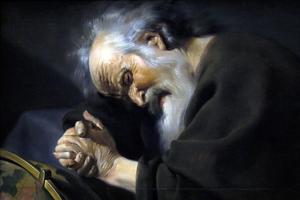The Light of Christ Defeats the Darkness of Idolatry
“For all the gods of the nations are idols, but the LORD made the heavens.” (Psalm 96)

For more than 20 centuries it has been the common practice among the civilized to distinguish between the world of pagan antiquity and the Catholic Thing that, in the plan of God, would soon supplant it.
By the early fourth century, in fact, thanks to the conversion of Constantine, everything had changed. Christianity made a clean sweep of all the household gods. In an arresting fresco by the baroque artist Tommaso Laureti (1530-1602), for example, called The Triumph of Christianity, we see the figure of the crucified Christ looming in triumph above the scattered remains of pagan statuary, the detritus of a world that is no more.
And so, with the great god Pan taking flight, all the other deities must scatter and die as well. A new measure of time begins, reflecting the great change wrought by the coming of Christ. The long dark ages before will be designated as B.C. and the period that follows will become A.D., which is an abbreviation of the Latin anno domini, meaning “in the year of Our Lord.”
Thus we see a long-established tradition, which, if only by constant and hallowed usage, has been determined to be worth preserving. But why exactly ought we to retain it? Why this particular line in the sand? Putting the question more sharply, was it necessary, not to say inevitable, that Christianity break with the pagan world in which it first found itself? Must the break have been quite so decisive?
The answer is yes. Because the pagan gods really were detestable and so it became imperative, along with their spurious pretensions, to smash them all to bits. No accommodation was possible.
This was no small achievement, by the way, in a world where a myriad of gods hovered about the mighty civilizations of Greece and Rome, Egypt and Persia. Yet every beastly one of them would be rejected and thrown over in the wake of the Christian triumph. In the architectural plans of the Church, no provision would be made for pagan superstition. Not a single trace would survive the Christian assault.
The problem with the pagan gods, of course, is that they were typically so much worse than the poor wretches subject to them, to the whims and furies of their tyranny. There were, for instance, 360 Egyptian gods, which averages out to about one per day, and not a single Egyptian could be found willing to spend even a fraction of his day in their company. No one was ever safe, nor entirely sure, in the world of the gods. That as regards their intentions, one would not dare predict motives of perfect benignity. Nor could anyone feel at peace in a world where countless malignant spirits, chthonic powers, were free to insinuate themselves into the lives of the innocent, the unsuspecting. And, of course, they were everywhere. A Chaldean inscription, for example, reads:
“They lie in wait. They twine around the rafters. They take their way from house to house and the door cannot stop them. They separate the bride from the embraces of the bridegroom; they snatch the child from between his father’s knees.”
If that isn’t harrowing enough, consider the Phoenician god Moloch, who would routinely exact child sacrifice as a sort of obscene gesture of propitiation. (Mightn’t his contemporary counterpart be federally-funded abortion?). Why would any sentient being wish to draw near to him?
Or any one of the Greek gods, for that matter. Indeed, here were deities who behaved very much like the Greeks themselves, only on a vastly more grandiose scale. In other words, they became angry, or sullen; they lusted; they conspired with and against one another; they were full of envy and pride, sloth and spite. And, of course, they were forever tormenting the poor Greeks. But, again, always on a grand scale.
It wasn’t possible, in other words, to love them. Fear, yes, and a healthy respect for the terrors they inspired. Plus, of course, as much distance as possible between the two of you. But hardly that love which characterizes relations among persons. Aristotle, for example, who made a show of believing in the gods, as did all pious pagans, would have been incredulous were anyone to tell him that, concerning Zeus, the most conspicuous feature about him was his capacity to inspire love. That would have struck old Aristotle as terribly funny, a species of black humor. And even in his most speculative of moments when, waxing philosophical, he spoke, not of the gods, but of God, there was never a hint that any personal predications need apply. The God of Aristotle was always Nous, or Mind, a purely abstract principle. In short, an Unmoved Mover, whom no one was ever moved to love.
And so, between the pagan world and the world that emerged out of the Christ Event, when God, first cloistering himself in the womb of a young Jewish girl, then growing up in order to suffer and die for sinners everywhere, there was simply no room to maneuver. One had to choose. Do we follow the light that came into the world, or its absence, its negation, allowing ourselves to be overtaken by the shadowlands, where snakes and trees and devils become objects of homage and worship?
We know the choice our ancestors made and, praise God, it was the right one. May we be found worthy, in these uncertain times, of that same light which first came into the world to illumine the darkness.
- Keywords:
- Jesus christ
- paganism
- idolatry
















